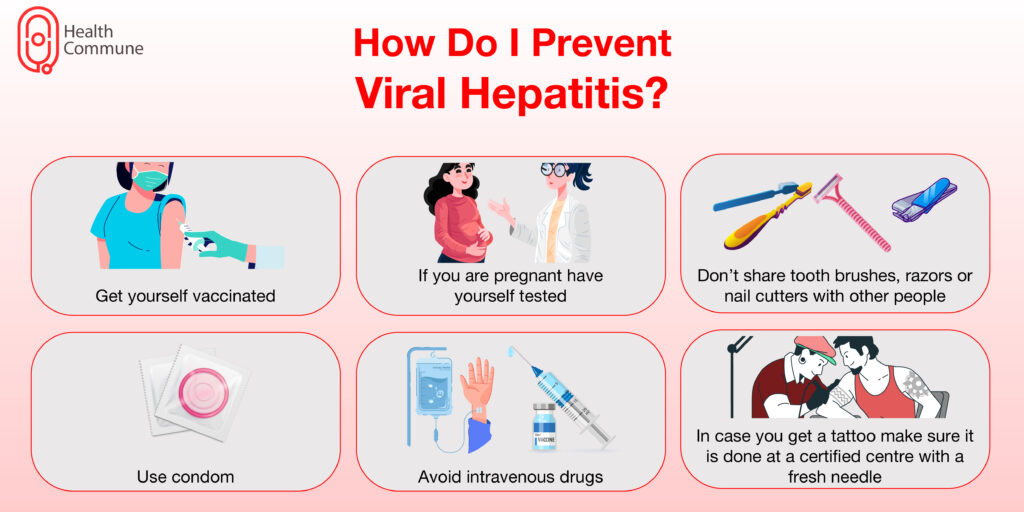What is hepatitis? What are its causes?
Hepatitis refers to the inflammation of the liver. It can occur for a multitude of reasons, including:
- Viral infections
- Excessive alcohol consumption
- Side effects of drugs
- Toxins
- Autoimmune conditions
- Genetic disorders
- Non-alcoholic steatohepatitis (NASH)
What are the causes of viral hepatitis?
Most commonly, they are caused by hepatitis viruses that include:
- Hepatitis A
- Hepatitis B
- Hepatitis C
- Hepatitis D (this exists only alongside hepatitis B; it does not exist on its own)
- Hepatitis E
Some less common causes include:
- Cytomegalovirus
- Epstein-Barr virus
- Herpes simplex virus
- Yellow fever virus
Approximately 40 million people in India are chronically infected with hepatitis B, while 6-12 million people suffer from hepatitis C. Furthermore, half of all hepatitis E cases in the world are found in India.
How does viral hepatitis spread?
Based on the type of virus, it can spread in different ways:
- Food and water: Contrary to popular belief, this disease is not only spread through blood and body fluids. Viruses types A and E are usually spread by the consumption of contaminated food or water. They are seen more commonly in overcrowded areas with poor sanitation. Food items such as shellfish, ice, and water have been responsible for outbreaks of hepatitis A previously
- Blood and body fluids: Hepatitis B, C, and D spread through contact with an infected patient’s blood. This can occur by:
- Sharing drug needles
- Undergoing blood transfusions with blood products that have not been screened
- Using unsterilized or unhygienic acupuncture needles or tattoos
- Vertical transmission (from mother to baby)

What are the symptoms of viral hepatitis?
The most common symptoms of acute disease are:
- Yellowish discolouration of the skin and eyes (jaundice)
- Fever
- Loss of appetite
- Nausea and vomiting
- Abdominal pain
- Dark-coloured urine
- Feeling of extreme tiredness or fatigue
How is hepatitis diagnosed?
Your doctor will take a detailed history and also do a physical exam to check if you have an enlarged liver. Additionally, they can advise you to get the following tests:
- A general blood test, including your liver profile. Your liver enzymes will be elevated if you have the disease
- Blood tests to check for the presence of the virus, antibodies against the virus, and viral load
- Ultrasound of your abdomen
How are hepatitis A and E treated?
Hepatitis A and E are usually self-limiting (except for type E in pregnant women) and resolve on their own. Some precautions that you can take to avoid getting these infections include good sanitary measures, consuming freshly cooked food from hygienic restaurants, avoiding undercooked foods (especially seafood), and avoiding eating from roadside places. Consume only boiled or bottled water.
How are hepatitis B, C, and D treated?
Your doctor may put you on certain antiviral medications and regularly monitor you for any side effects or liver damage.
In case of long-term or severe liver damage, your doctor can recommend:
- Albumin transfusions: Your doctors can transfuse albumin, a protein normally produced by your liver, in case your liver is not able to produce enough albumin on its own
- Ascitic tap: Due to liver damage, there can be an accumulation of fluid in your abdomen. This condition is called ascites. Your doctor will insert a small tube into your abdomen through which they will drain out the fluid
- Liver transplantation (for end-stage liver disease)
How can I prevent viral hepatitis?
You can certainly prevent or reduce your chances by:
- Getting yourself vaccinated: Vaccines are available for hepatitis A and B. At present, there are no vaccines for the other types of viruses
- Using a condom while having sex. Avoid having unprotected sex to reduce your chances of getting a sexually transmitted disease. Avoid having multiple sexual partners as well
- If you’re pregnant, get yourself tested
- Don’t share toothbrushes, razors, or nail cutters with other people
- Avoid intravenous drugs
- When getting a tattoo or undergoing acupuncture, ensure you choose certified and hygienic places that adhere to proper precautions. Verify that a new needle is always used.
I’m diagnosed with hepatitis B or C. What precautions should I take?
Be responsible, and make sure you take certain precautions to minimise your chances of passing on the disease to other people. These include:
- Not donating blood, tissues, or organs
- Always use a condom while having sex
- Not taking illegal intravenous drugs or sharing needles
- Ensure that you get your child vaccinated
Do I need to take the hepatitis vaccine?
Vaccines are especially recommended for:
- Infants
- Young adults
- People with an infected partner
- Those diagnosed with a sexually transmitted disease
- People having multiple sex partners
- Drug addicts
- Healthcare professionals
What are the complications of hepatitis?
Hepatitis B, C, and D can lead to a multitude of complications. Your liver can undergo chronic damage, which can interfere with its normal functions and impair its ability to secrete proteins, clotting factors etc. Complications include:
- Liver cirrhosis
- Liver failure
- Liver cancer
While type E is usually self-limiting, it can be particularly dangerous in the case of pregnant women and carries a high mortality rate in this group.
What’s the relation between hepatitis B and HIV?
Both hepatitis B and HIV spread chiefly through infected blood or body fluids and sexual contact. Thus, people who are at a high risk of developing HIV are also at a high risk of developing hepatitis B, and vice versa. This disease is also a leading cause of death among people with HIV due to its tendency to progress more rapidly in this group.




